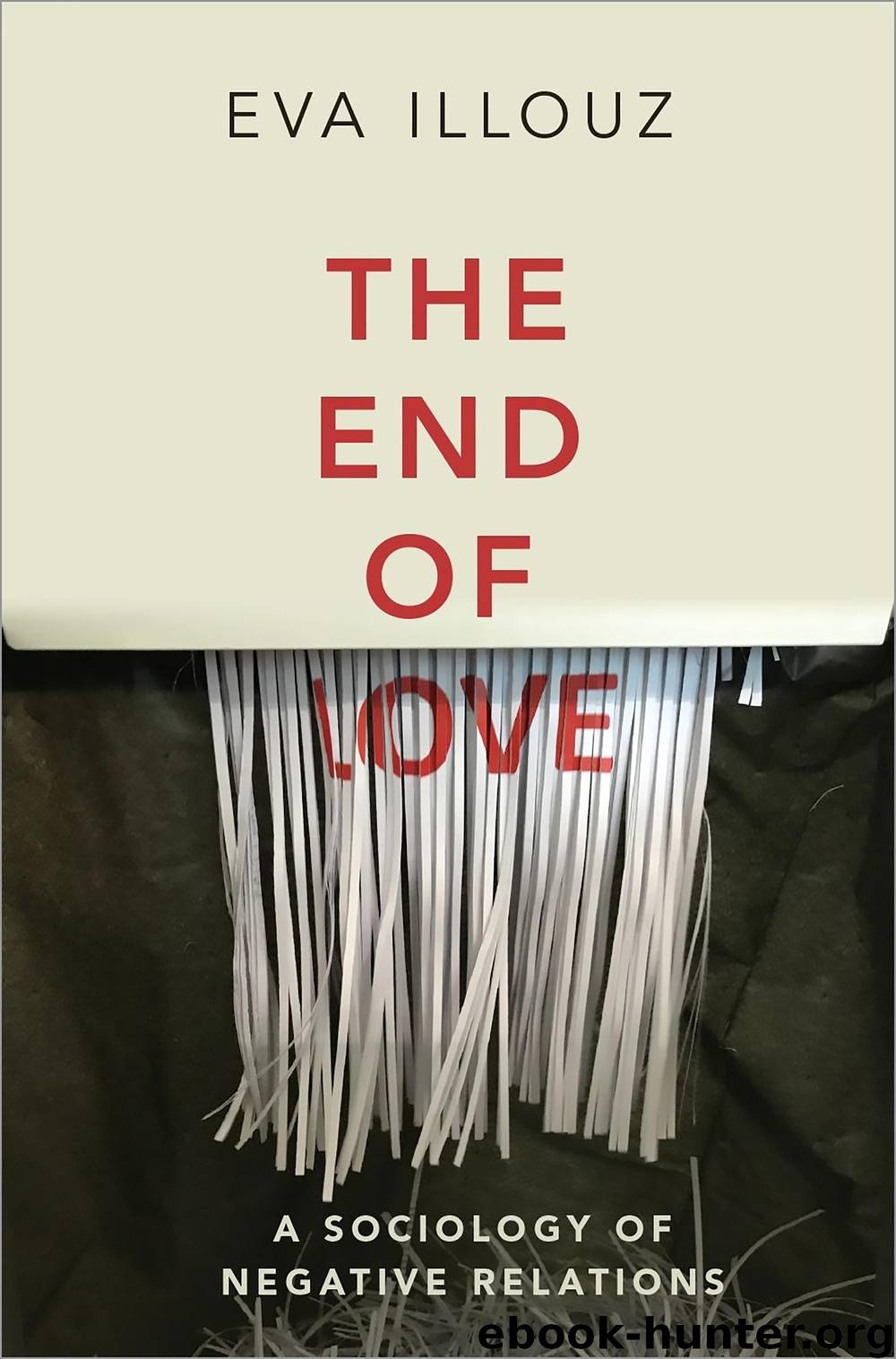The End of Love by Illouz Eva;

Author:Illouz, Eva; [Illouz, Eva;]
Language: eng
Format: azw3, epub
Publisher: Oxford University Press USA - OSO
Published: 2019-09-03T00:00:00+00:00
In a similar and resonant vein, Cyril, a sixty-seven-year-old French man, employed as a journalist, recounts his first experiences:
When I was young, two women left me; each one for her own reasons. And each did that quite abruptly. I was in love with them and I think I remained traumatized by this. I was never able to fall in love again. I did not count on anyone anymore. I have very pleasant relationships with women, but I have never fallen in love again in quite the same way. That’s why I find it so much more comfortable to have several relationships at once. You are never quite vulnerable in the same way if you have several relationships at once.
These examples illustrated how breakups affect the capacity to trust the future, which in turn generates psychological and emotional structures to close off and protect the self.
In the economic realm, exit has become the main mode of operation of the market at its two opposite ends. On the side of production, firms offshore their operations, close plants, and lay off workers; and on the side of consumption, large stores do not build a relationship based on personal acquaintance and loyalty, and make exit a normal and routine option for consumers looking for the best bargain. As Hirschman put it in Exit, Voice and Loyalty, a deep assumption of economists is that the lapses or losses of firms are not something to pay attention to: “As one firm loses out in the competitive struggle, its market share is taken up and its factors are hired by others, including newcomers; in the upshot, total resources may well be better allocated.”48 The moral indifference to breakups seems to follow a similar logic of blind efficiency. As they aim to maximize the individual well-being, they are on the whole and are generally perceived as a way to improve one’s performance (“accumulating experience,” “learning who one is,” “choosing someone more compatible”) and as a better way to allocate one’s resources (choosing the right person). Both in the economic and sexual realms, the very notions of efficiency, costs, and utility break down the notion of contract. As Richard Sennett put it in his Culture of the New Capitalism:
The head of a dynamic company recently asserted that no one owns their place in her organization, that past service in particular earns no employee a guaranteed place. […] A peculiar trait of personality is needed to do so, one which discounts the experiences a human being has already had. This trait of personality resembles the consumer ever avid for new things, discarding old if perfectly serviceable goods, rather than the owner who jealousy guards what he or she already possesses.49
Breaking up is part and parcel of a culture in which people are quickly outdated, replaced by the reality or possibility of partners that correspond more narrowly to their emotional needs and lifestyle interests. The move from breakups to new relationships requires, as in the economic sphere, a certain forgetting of
Download
This site does not store any files on its server. We only index and link to content provided by other sites. Please contact the content providers to delete copyright contents if any and email us, we'll remove relevant links or contents immediately.
Rewire Your Anxious Brain by Catherine M. Pittman(17589)
Talking to Strangers by Malcolm Gladwell(11876)
The Art of Thinking Clearly by Rolf Dobelli(8841)
Mindhunter: Inside the FBI's Elite Serial Crime Unit by John E. Douglas & Mark Olshaker(7834)
Becoming Supernatural by Dr. Joe Dispenza(7105)
Change Your Questions, Change Your Life by Marilee Adams(6641)
The Road Less Traveled by M. Scott Peck(6634)
Nudge - Improving Decisions about Health, Wealth, and Happiness by Thaler Sunstein(6633)
The Lost Art of Listening by Michael P. Nichols(6473)
Enlightenment Now: The Case for Reason, Science, Humanism, and Progress by Steven Pinker(6405)
Win Bigly by Scott Adams(6311)
Mastermind: How to Think Like Sherlock Holmes by Maria Konnikova(6235)
The Way of Zen by Alan W. Watts(5799)
Daring Greatly by Brene Brown(5640)
Grit by Angela Duckworth(4736)
Big Magic: Creative Living Beyond Fear by Elizabeth Gilbert(4723)
Men In Love by Nancy Friday(4322)
Flow by Mihaly Csikszentmihalyi(4052)
The Four Tendencies by Gretchen Rubin(4024)
